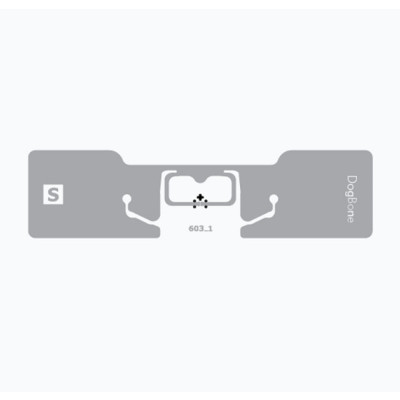Navigation
Avery Dennison Smartrac Product Information
AD Dogbone® M730
Introduction:
The AD Dogbone M730 is a robust RFID inlay tailored for diverse uses such as in the automotive sector, logistics, and sports events. It operates within the UHF frequency range of 860–960 MHz and adheres to the ISO 18000-63 EPC class 1 Gen 2 global standard.
Key Features and Details:
- Chip: Equipped with the Impinj M730 IC, the AD Dogbone M730 includes 128-bit EPC memory and a 96-bit Serialized TID with a 48-bit serial number. The inlay also incorporates an advanced "autotune" feature for enhanced RF tuning adaptability.
- Antanna Size: 94 x 24 mm (3.70 x 0.90 in)
- Die-Cut Size: 97 x 27 mm (3.82 x 1.06 in), designed for labels up to 100 mm (4 inches) wide.
- Available Formats: Offered in dry inlay, wet inlay, and paper tag configurations.
- Inlay Substrate: PET
- Liner Material: Silicon liner
- Pitch: 30 mm (1.18 in)
- Web Width: Between 97 mm (3.8 in) and 100 mm (3.94 in)
- Core Diameter: 76 mm (3 in)
- Reel Capacity: Up to 10,000 pieces per reel for dry and wet inlays, and 3,000 pieces per reel for paper tags.
- Temperature Range: -45 °C to 85 °C (-49 °F to 185 °F)
Advantages:
The AD Dogbone M730 excels in global performance, particularly on challenging surfaces, thanks to its resilience against detuning from high dielectric materials. The M730 IC provides superior read and write sensitivity, enabling efficient bulk reading, which is ideal for inventory management, logistics, and sports timing applications. The privacy mode feature also adds a layer of security for loss prevention and safeguarding consumer data.
Quality and Standards:
The AD Dogbone M730 inlays are produced to meet stringent industry criteria, as verified by the RFID Lab at Auburn University, which has granted Avery Dennison its initial comprehensive ARC certification for quality assurance.
Compliance:
- RoHS: Meets the standards of EU Directive 2011/65/EC and Directive (EU) 2015/863
- REACH: In compliance with Regulation (EC) No. 1907/2006)
Handling and Warranty:
Avery Dennison's standard terms and conditions are applicable. RFID inlays are vulnerable to ESD; it is recommended to follow standard industry protocols to minimize environmental and static impacts.
For further details and inquiries, please visit rfid.averydennison.com/contact or reach out at +1-678-617-2359.
Refine Your Options
-
Avery-Dennison AD Dogbone M730 RFID Tag
Part #: 3008054 | SKU: AVE759158RFID Tag - Avery-Dennison AD Dogbone M730 - RFID Paper Label - 3.82 x 1.06 - Impinj Monza M730 Chip - AD Dogbone M730 inlay - UHF Frequency - Ideal for Automotive, Events - Sports - Industrial Applications, Logistics .








